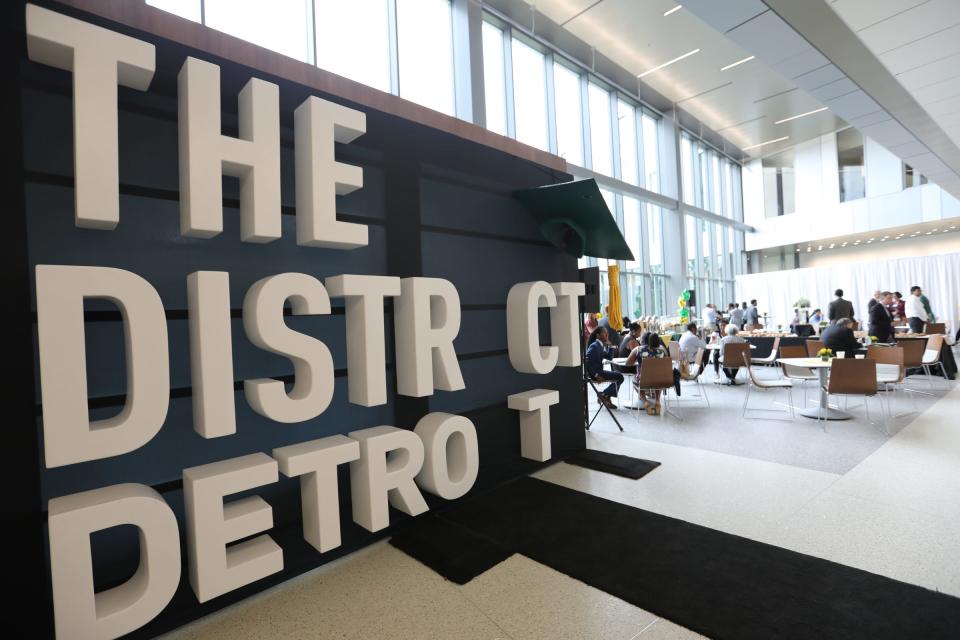Opinion: We served on the District neighborhood council. This is a good deal for Detroit.
Over nearly two months of meetings, a group of residents living in the neighborhood of the proposed $1.5 billion District Detroit development successfully negotiated the largest-ever community benefits agreement (CBA) since the city’s community benefits ordinance was enacted in 2017.
Some were appointed by the administration, some by members of City Council and some were elected by our neighbors. We volunteered our time, including 13 community and working meetings, plus multiple appearances to testify at City Council, came together with unity of purpose and were able to craft a sweeping $167 million benefits package that was approved by an 8-1 vote. We moved swiftly — but deliberately — because we understood the devastating effect bureaucratic delays can have on development projects. We understood the importance of being good public partners to secure investments — especially transformational investments — in our city.
That is why it is so profoundly discouraging to see that our full time City Council is taking just as long to cast one vote on the proposed incentives — none of which take a dollar from the city’s budget — putting this historic community benefits agreement and the $1.5 billion development itself at serious risk of being lost. If not fully and finally approved on Tuesday, the project will miss referral to the April meeting of the Michigan Strategic Fund, putting $400 million in State of Michigan support at risk of being given to other projects outside of Detroit while City Council fails to take decisive action.

The NAC negotiated an agreement that will bring to our community at least $100 million in contracts to disadvantaged and Detroit-based businesses, and we included safeguards, like an independent review, to ensure the developers deliver. Other benefits include the developer’s agreement to accept Section 8 vouchers, and to make 139 affordable units of the new apartments that will be a part of this development even more accessible and affordable to low-income Detroiters. This means Detroiters of very low income levels will have the opportunity to live side-by-side with people earning far higher incomes, with access to the same amenities. ]
More:Exempting delivery charges from Michigan sales tax could be budget buster, agency warns
More:Long outdoor medication lines too long for prisoners
The CBA also includes $3.5 million to help pay the cost of parking for all tenants in the affordable housing units, $1 million to Cass Tech to develop a first-class outdoor athletic complex, $1.5 million to help get more Detroiters into apprenticeship training programs and a $1 million fund to support disadvantaged small businesses to make sure Detroiters can access job and retail opportunities created by this development. If this development project dies at the Council table, that’s not all that dies. No development, no community benefits.
The District Detroit development is extraordinary in that none of the proposed incentives take away from the city’s general fund — in fact, taxes paid during the construction phase of this development, when the project is complete and these new buildings are fully occupied with residents and workers, are projected to generate an annual $21 million in revenue for the city's general fund. That new revenue from a downtown development won’t stay downtown; it will go to pay for city services across all neighborhoods, including police and fire protection, better parks, blight removal, beautification efforts and more. It also brings $400 million in state incentive investment into Detroit that instead could have gone to fund development projects elsewhere in Michigan.
With its four new office buildings, four residential buildings and two hotels — ready to start construction this year — the District Detroit represents the kind of large-scale construction we all have said for generations we want to see return to Detroit. Now is our chance to make it happen.
It’s time for City Council to stop delaying. It’s time to vote. If Detroit can’t manage to approve a development like this, don’t expect us to see another one like it — or a $167 million community benefits package — for a long time. Please contact your city council members today, and urge them to support this development and the community benefits it will bring with it.
Chris Jackson is chair of the Neighborhood Advisory Council and Rogelio Landin is the council's vice chair. Deirdre Jackson and Jonathan C. Kinloch serve as the Detroit City Council's NAC appointees.
This article originally appeared on Detroit Free Press: Opinion: Council, OK subsidies, benefits for Ilitch District Detroit

